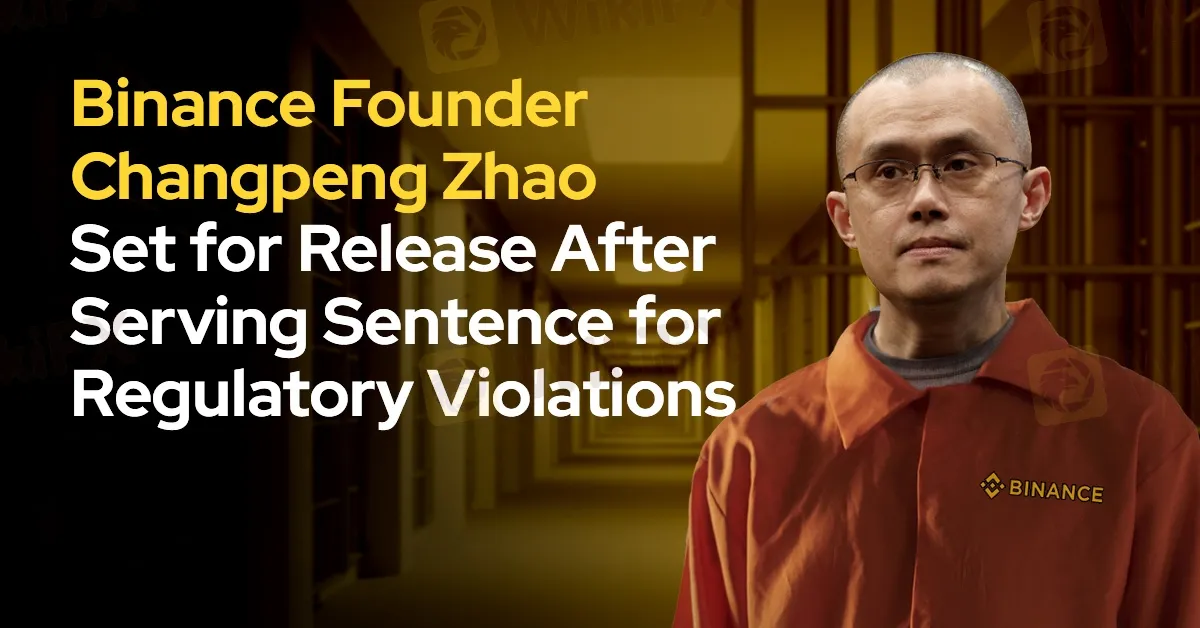简体中文
繁體中文
English
Pусский
日本語
ภาษาไทย
Tiếng Việt
Bahasa Indonesia
Español
हिन्दी
Filippiiniläinen
Français
Deutsch
Português
Türkçe
한국어
العربية
Binance Founder Changpeng Zhao Set for Release After Serving Sentence for Regulatory Violations
Abstract:Changpeng Zhao, the founder of cryptocurrency exchange Binance, is set to be released from custody on September 29, as indicated by the U.S. Bureau of Prisons website.

Changpeng Zhao, the founder of cryptocurrency exchange Binance, is set to be released from custody on September 29, as indicated by the U.S. Bureau of Prisons website. Zhao, identified as inmate 88087-510, has been serving a four-month sentence at Lompoc II, a low-security prison in California. His sentence will conclude with a short period at a halfway house in San Pedro, California.
Zhao's imprisonment began after he pled guilty to violating the Bank Secrecy Act due to Binances failure to implement proper Know Your Customer (KYC) procedures. As part of the plea deal, he agreed to pay a substantial fine of $50 million and to step down from his position as CEO of the exchange. His sentence at Lompoc II, which holds around 2,160 inmates, contrasts sharply with the harsher conditions of the New York prison where Sam Bankman-Fried, former CEO of FTX, is serving a 25-year sentence for unrelated charges.

Following Zhao‘s resignation in April, Richard Teng, a former regulator from Abu Dhabi and Singapore, took over as CEO of Binance. The company itself faced criminal charges for violating U.S. sanctions and money-transmitting laws, for which it agreed to pay $4.3 million in settlements. Zhao’s sentencing followed the culmination of multiple investigations into Binances regulatory compliance and its operational practices in the U.S.
The legal case against Zhao drew significant attention given his prominence in the cryptocurrency world. Prosecutors originally sought a three-year sentence, but a federal judge reduced the term to four months, which was longer than those imposed on some other crypto executives for similar offenses. Despite the relatively brief sentence, Zhao's time in custody made him one of the highest-profile figures to face incarceration for violations related to cryptocurrency regulation.
Throughout his incarceration, Zhao remained a subject of speculation, especially with rumours surfacing online about his whereabouts after his transfer from Lompoc II in late August. However, the Bureau of Prisons continued to list September 29 as his official release date. Before entering prison, Zhao hinted at plans to use his time behind bars to work on a writing project, though details about this endeavour remain unclear.
Zhaos net worth, estimated at $36.5 billion by Bloomberg, places him among the wealthiest individuals to have ever been incarcerated in the U.S. His case highlights ongoing challenges in regulating the rapidly evolving cryptocurrency industry, and his release is expected to draw further attention to the future of Binance under new leadership.

Disclaimer:
The views in this article only represent the author's personal views, and do not constitute investment advice on this platform. This platform does not guarantee the accuracy, completeness and timeliness of the information in the article, and will not be liable for any loss caused by the use of or reliance on the information in the article.
Read more

Gigamax Scam: Tracking Key Suspects in RM7 Million Crypto Fraud
Malaysian authorities are actively pursuing seven individuals linked to the Gigamax investment scam, which has defrauded investors of over RM7 million. The suspects include an Indonesian national, identified as Awaludin, who is believed to be the mastermind behind the scheme, and six Malaysians who served as promoters and speakers for the fraudulent operation.

Singaporean Arrested in Thailand for 22.4 Million Baht Crypto Scam
Thai authorities have apprehended a 32-year-old Singaporean man suspected of being part of a transnational syndicate involved in cryptocurrency scams. The group is accused of defrauding victims of more than 22.4 million baht (S$886,000) through a fraudulent trading platform.

Kraken and BitGo to Handle FTX Payouts Starting January 2025
Kraken and BitGo will oversee the first FTX payouts starting January 3, 2025. 98% of creditors receive at least 118% of their claims in cash.

FCA Seeks Input to Shape UK Crypto Market Regulations
UK FCA seeks public feedback on crypto rules to improve market transparency, protect consumers, and support growth. Comments are open until March 2025.
WikiFX Broker
Latest News
Geopolitical Events: What They Are & Their Impact?
Volkswagen agrees deal to avoid Germany plant closures
Top 10 Trading Indicators Every Forex Trader Should Know
TradingView Launches Liquidity Analysis Tool DEX Screener
MultiBank Group Wins Big at Traders Fair Hong Kong 2024
WikiEXPO Global Expert Interview: Simone Martin—— Exploring Financial Regulation Change
'Young investors make investment decisions impulsively to keep up with current trends' FCA Reveals
Why Do You Feel Scared During Trade Execution?
CySEC Settles Compliance Case with Fxview Operator Charlgate Ltd
Malaysian Influencer Detained in Taiwan Over Alleged Role in Fraud Scheme
Currency Calculator


